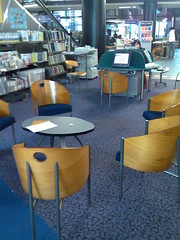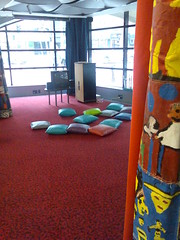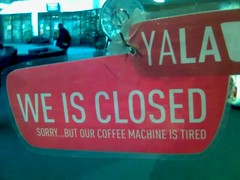The only true voyage . . . would be not to visit strange lands but to possess other eyes, to see the universe through the eyes of another, of a hundred others, to see the hundred universes that each of them sees. ?Marcel Proust
Blended learning -- blended learning -- blended learning?
For so long now we've considered blended learning to be the most useful way to draw together online and face-to-face approaches. We've come to understand (or at least feel comfortable with) blended learning as it draws together people and resources in a range of settings and formats...but, have we really blended learning?
It seems much of our blended learning practices are about modes of delivery and formats of resources (see this example, by Namit Kishore, NIIT). Have we limited our view and potential to be able to really blend or hybridise learning opportunities? Where are the learners?

At the recent eFest conference in New Zealand, Diana Oblinger (Educause) presented a keynote speech about the changing face of learning that included - more than ever - informal learning and increased diversity of learners in increasingly blurred learning settings where work, study and life collide. Oblinger began her presentation with these words:
One student walks across campus listening to an iPod; another is engrossed in text messaging on her cell phone. During class, they're Googling, IMing and playing games?often at the same time. More likely to use the library as a gathering place than a resource, this is the Net Generation. They co-exist beside older students who are juggling work, childcare and eldercare. Do we understand our learners? What do their experiences, attitudes and expectations mean for educational institutions?
Indeed, are we listening to what we are seeing in our learners?
There are recent efforts by some educators to tackle aspects of blended learning, responding with more fluid and open learning designs and spaces for diverse learners' needs, that also value personalised learning approaches. I agree with Oliver and Trigwell (2005) that we need to "radically reconcieve" the phrase, and re-centre the learner as key to a blended learning philosophy, "by exploring change [and patterns of change?] from the perspective of the learner" (p.24).

We need to look at what is being blended and why, and I considered this while listening to Oblinger's keynote at eFest. I think blended learning must involve recognition of
- multiverses
- learning spaces (more commentary on learning space design here and here)
- diverse and differing values of people
- relinquishing the term 'roles' in favour of a less abstracted notion of being in the world.
Oblinger described a number of learning processes, concepts and settings that speak to a more enlightened view of blended learning. She described projects like the Learning Spaces Project at Denison University, as an illustration of practical aspects of blending learning that move beyond simply delivery considerations. The TLT Group also present some non-traditional ideas about the development of approaches and spaces that enable blended forms of learning. These forms recognise the value of
- communication and making connections with other people
- provide basic and necessary infrastructure to allow learning to occur
- share (increasingly scarce) resources appropriate to the learning taking place
- encourage learners to interact spontaneously
- draw on moments of serendipity
- allow facilitators to pick up on motivations of learners and tailor instruction/guidance as a result
- space becomes interactive, multi-sited, 'porous' and dynamic.
These days the Internet is our information universe, as Oblinger described it. For many, the Internet has become a personalised learning space; flexible, dynamic, fluid and connected.

(Image by Mobology)
In light of this, I liken a refreshed definition of blended learning to RSS. Stephen Downes (in his eFest keynote) described RSS as a 'mess' of technologies (of which there are a number of variations). We use RSS to 'pull' information and services to us to suit our individual needs and preferences. RSS is a good metaphor (as well as a technical tool) for understanding ways in which learners can pull together threads of learning to create a blended setting in which learning occurs - elements loosely joined. We could very well view learning as a 'pull' activity, dependent on the learner's preferences and needs at the time. A learner can 'RSS' types, formats, contacts (activities, networks, resources), blending their own learning environment.

Concluding questions...
As we continue to debate the future(s) of learning, Downes additionally challenges us with the notion of an alternative education system that is publicly funded and open to all, "that could be tapped into by traditional institutions, if they choose". Is it possible it could be something like this?
- An 'RSS-ed' view where the learner draws together threads/services (metaphorically and technically) to create their own learning space, complete with people, resources and contextualised information?
- Should we be thinking more about future scenarios that are set to challenge the relevance of our current systems?
- Do we attempt to eat our current systems from the inside-out OR must we take the party elsewhere?
- Should our institutions operate more like 'containers' for supporting learning spaces (through provision of infrastructure), motivated more by the learners' needs and less by curriculum?
- Will there come a day when we can say "ACME Institute works for me?"
- Will education return to being a (publicly-funded) service supporting people, instead of a business focused on 'user pays' and 'the bottom line'?
- How do we engage with the tensions of education in a networked society?
References
Downes, S. (2006) Keynote address, eFest 2006, September 27-29, Wellington, NZ.
Kishore, N. (2002) Blended learning - Fixing the mix, NIIT Technologies.
Oblinger, D. (2006) Keynote address, eFest 2006, September 27-29, Wellington, NZ.
Oliver, M. & Trigwell, K. (2005) Can 'blended learning' be redeemed? E-Learning, 2(1), 17-26.
Images by margoconnell, unless otherwise stated.[blended_learning], [open_education], [flnw], [oblinger], [downes], [efest_2006]
No comments:
Post a Comment